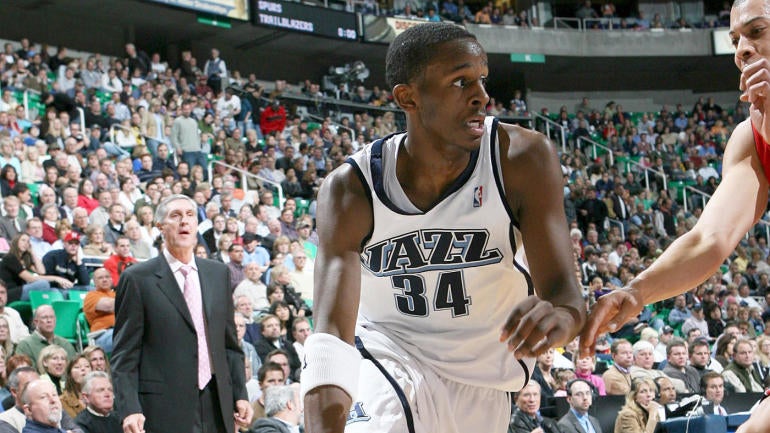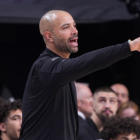
For C.J. Miles and Jerry Sloan, it was tough love at first sight. In 2005, Miles was a skinny 18-year-old on the verge of jumping from Dallas' Skyline High School to the NBA, Sloan a coaching legend who had been employed by the Utah Jazz since before Miles was born. After a physical pre-draft workout against a bunch of older, stronger players, Sloan informed Miles that they were there to beat him up.
"I just wanted to see if you were going to get up," Sloan told him.
The Jazz drafted Miles with the No. 34 pick, making him the youngest player in franchise history, and Sloan sat him on the bench until he got some seasoning. Miles played a total of 203 minutes as a rookie and 373 the next year, not counting his time with the Albuquerque Thunderbirds and Idaho Stampede.
After Sloan died last Friday at the age of 78, several obituaries resurfaced his classic quote about Miles: "I don't care if he's 19 or 30. If he's going to be on the floor in the NBA, he's got to be able to step up and get after it. We can't put diapers on him one night and a jockstrap the next night. It's just the way it is."
In a phone interview, Miles called the quote "hilarious." He remembers that Sloan said it during his second season, by which point he had plenty of experience with the coach's brand of candor. He remembers that people thought his feelings would be hurt.
"People asked me about that," Miles said. "I was like, no, it didn't hurt my feelings. Because 1) he had said worse to me before, 2) I knew where he came from when he spoke to me. He wasn't trying to embarrass me."
During his rookie season, Miles spotted Sloan and some other Jazz staffers while out with his agent and a couple of friends in New Jersey. He stopped by their table to exchange pleasantries. "You got some good size on you," Sloan said to him. "You play ball?"
Sloan was fierce, funny and fair. He chided Miles in practice often, but no differently than he chided Deron Williams and Andrei Kirilenko when they made mistakes. "We both knew I had a lot to figure out," Miles said, but Sloan "went out of his way to let me know when I was doing things right also." He came away from every chat with Sloan believing his coach had put thought into his development.
"It's not Phil Jackson style, where it's deep and all these books he tells me to go read and all that," Miles said. "It's just straight-up man-to-man conversation, looking each other in the eye, like, 'I need this, this and this from you because I know you can do it. I've seen you do it. What can I do to help you?'"
It was Dec. 2, 2008, but Miles remembers it like it was yesterday: The Jazz were in Sacramento, and his left elbow was bothering him. He decided to wear a shooting sleeve, violating one of Sloan's many rules, but kept it hidden underneath a warmup shirt as long as he could. It was only visible after the huddle, as he slapped hands with his teammates and coaches on his way to the court.
"What the f--- is that?" Sloan said at the sight of the offending accessory. Miles laughed, secure in the knowledge that there was no time to discuss it.
If a player's drawstring wasn't tucked into his shorts at practice, Sloan would pause the proceedings to address the situation. Early in his career, Miles checked into a game, played a couple of possessions and was summoned back to the bench at the next dead ball. Only after sitting down did he learn this was because his jersey was untucked.
Sloan and assistant coach Phil Johnson were "just like two grandpops with their kids sometimes," Miles said. At one training camp in Boise, Idaho, players hyped each other up in a competitive defensive-slide drill. Sloan blew the whistle and announced that he was displeased with the noise: "I want to hear a rat piss on cotton in here."
Later in that same practice, several Jazz players scrambled for a loose ball. One dove on the floor as it rolled out of bounds. Sloan approved, saying, "That's the type of stuff that turns me on."
Sloan's teams had a no-layups policy on defense and regularly led the league in fouls. He demanded the same physicality in scrimmages, and Miles recalled that there were some in which Sloan decided not to call fouls. One ended when a Utah player flung another to the floor by his jersey.
"We were beating the crap out of each other in there," Miles said.
If practice was supposed to end at a certain time, however, it would. Sloan believed in structure and in holding himself accountable. He also had an absolute aversion to self-promotion, and no one ever heard him complain about his status as the best coach to never win Coach of the Year.
"He didn't care about any of that stuff, man," Miles said. "John Deere hat every day. He used to ride around in a 15-passenger van because he used to pick up antiques so he needed the space. He was just -- he was a guy, man. He was The Guy. He was the toughest dude ever."
Miles was in his sixth season in Utah when Sloan resigned. He has all sorts of stories. There was the time that a bunch of Jazz players were sitting around in a hotel lobby in Portland during the preseason, and Sloan told a roster hopeful, "Don't worry, I'm not going to cut you … yet." There was also the time that Sloan approached Miles with a plan to bring him off the bench, so he could play a more featured role and expand his game. The latter isn't as amusing, but Sloan knew that if you are going to be demanding, it helps to have empathy.
"Nobody wants to be around a hardass all the time," Miles said.
Sloan never went off on the Jazz after losses when he felt like they had fought hard. He shared the values held by Miles' high school coach, J.D. Mayo, only he expressed them with more colorful language. Even when Miles was hardly playing and wasn't physically ready for the league, he understood what Sloan wanted and trusted that he was on the right path. If he were given heavy minutes as an 18-year-old, he said, it might have been the worst thing for him.
Miles credits Sloan for his non-negotiable routine throughout the season, which he believes is the foundation for his entire career. As mentoring younger players has become part of his job description, he has found himself thinking back to his early days in Salt Lake City.
"It might be in my own vernacular," Miles said, "but I'm definitely repeating 80 percent of the stuff that he told me."
Miles was with his parents when he found out Sloan died. The family sat around and told stories about the Hall of Fame coach, and over social media Miles talked to former Jazz teammates. Sloan may be the toughest dude ever, but Miles will never forget hanging out with him in hotel lobbies the night before road games. Everything that Sloan did and said was "out of love," Miles said, even the diapers/jockstrap comment. And for the last 15 years, Miles has carried a certain confidence in what he calls his mental wallet, drawn directly from Sloan.
"He gave me the chance," Miles said. "Like, he brought me in. He drafted me. I was there for, what, 33 picks before that, you know? He saw something in me. He picked me. He told me that. He let me know, and he pushed me. And I'm thankful."






















